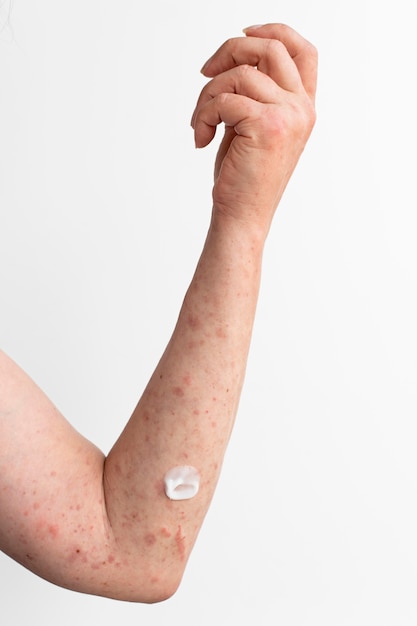
If you have eczema, certain foods might help reduce the inflammation that leads to dry, itchy, and flaky skin, according to nutritionist Olga Hamilton. Eczema is a long-term inflammatory skin condition that can cause discomfort, and it’s estimated that one in five children and one in twelve adults in the UK have it. While diet isn’t the root cause, certain foods can trigger eczema flare-ups.
Research indicates that diet can worsen eczema, with reactions happening shortly after eating certain foods. Here are five dietary tips from Olga Hamilton to help manage eczema:
1. Probiotics: These live microorganisms support your immune system and inhibit harmful bacteria in your gut. Common strains include Lactobacillus and Bifidobacterium, found in foods like yogurt, water-based kefir, raw cheese, natto, tempeh, miso, kombucha, sauerkraut, and kimchi. Including a small amount of these fermented foods daily can help ease eczema by reducing inflammation and protecting against immune dysfunction.
2. Prebiotics: Prebiotics are indigestible carbohydrates that feed the good bacteria in your gut, helping them grow. Sources include beans, legumes, Jerusalem artichokes, leeks, shallots, chicory, asparagus, mushrooms, garlic, and onions. Aim for three portions of these vegetables daily to make probiotics more effective.
3. Liver-Friendly Foods: Poor liver function can contribute to eczema. To support your liver, include more cruciferous vegetables like cabbage, kale, broccoli, cauliflower, and Brussels sprouts. These vegetables help the liver produce detoxifying enzymes, reducing inflammation and improving overall liver function.
4. Turmeric: This spice, common in Asian cuisine, contains curcumin, which has anti-inflammatory and antioxidant properties. Studies have shown that turmeric can reduce eczema symptoms like scaling, thickening, and itching. Incorporating turmeric into your diet can help manage eczema.
5. Vitamin D: Essential for several body systems, vitamin D is produced in the skin via sun exposure and found in foods like wild oily fish, vitamin D-enriched mushrooms, and grass-fed cow’s butter. Research has linked low vitamin D levels to eczema, as it helps regulate the immune system and reduce inflammation. Many people in the UK have low vitamin D levels, so it’s important to ensure adequate intake.
By incorporating these dietary changes, you may be able to better manage your eczema symptoms and reduce flare-ups.

